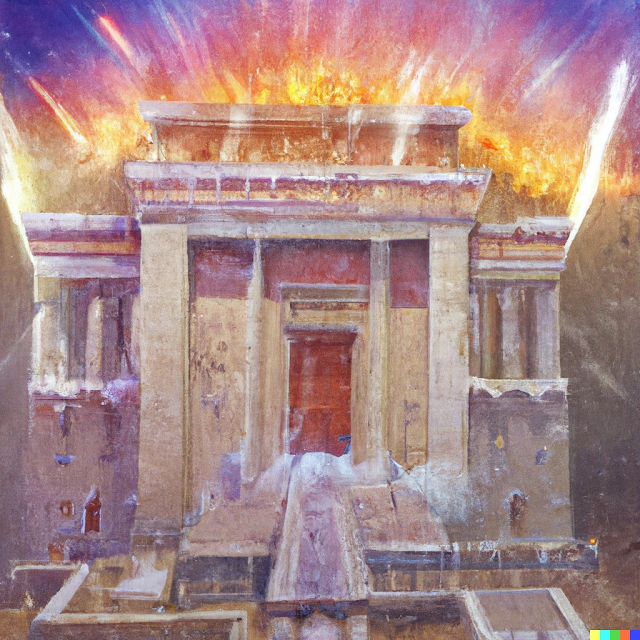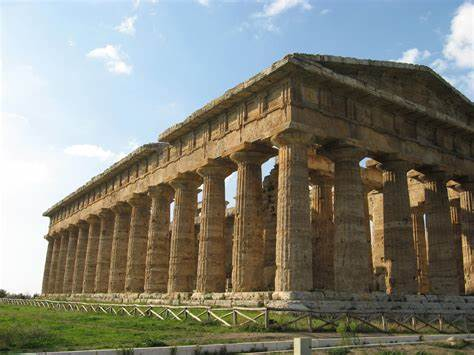
Rumors.
That’s the given reason for dozens of stabbings in Israel over the last month. Palestinians stabbing Jews over rumors.
What rumors, you ask?
Why, the rumors that Israel is changing the status quo on the Temple Mount, of course!
What’s the status quo on the Temple Mount?
Read for yourself. Below is a firsthand account from a Messianic woman who visited the Temple Mount just days ago as part of the HaYovel group.
“We spent the day yesterday in the old city of Jerusalem. In the last few days, we’ve had speakers each evening and have learned so much about Jerusalem and the Temple Mount that I felt like I knew Jerusalem much better this time as we came into the city. One of our speakers was named Ezra and he was one of the soldiers who fought in 1948 for the survival of Israel in its earliest days of statehood. He experienced an incredible number of miracles and God saved his life on a number of occasions. A couple of his stories had us all literally on the edges of our seats, eyes wide, just waiting to hear how he made it out of the situation.
“Our Jerusalem has been waiting for us for 2000 years!”
His words and his face showed so much love and passion for the Land as a whole and for Jerusalem specifically. They had tried to liberate Jerusalem in that war and it touched me deeply to hear him recount how he had told his commander how they needed to focus on Jerusalem because... “our Jerusalem has been waiting for us for 2000 years!” He said that as the soldiers gathered together to fight the Jordanians for Jerusalem, they were all excited...“We were on wings of excitement! Everyone looked so different, so bright. I thought the Maccabees must have looked the same before they went to liberate Jerusalem.”

They weren’t able to keep the city and they lost it to Jordanian control until 1967. Ezra told us that he lived those in-between years “with one eye on Jerusalem.” And then as he told us about the miracle of finally liberating Jerusalem in 67, he quoted the words of Psalm 118 – “I shall not die, but live and proclaim the works of the Lord!”
I wish I could repeat the whole evening for you word for word. It was amazing.
Back to yesterday morning: I helped in the kitchen, getting breakfast ready and serving it, and then ran to gather my things and to get on the bus. This time, because of the security situation, once we reached Jerusalem, we didn’t walk down the Mount of Olives like we have done many times in the past; we just drove down it, across the Kidron Valley, and then up to the Old City. We entered through the Dung Gate and then stood in line waiting to be able to go up to our first stop - the Temple Mount.
The Temple Mount and the Status Quo
The Temple Mount has been a big deal lately in Israel and the world – it’s been in the discussions of the Israeli government, it’s been all over the media, and the Palestinians have been rioting because their religious leaders have been claiming that Israel is going to allow Jewish people and others (anyone other than Muslims) to pray on the Temple Mount. They also have been claiming that Israel has no historical connection to the Mount, that it’s always been Muslim and that Jewish people going up on it defiles it. You always hear government leaders of the world speak of needing to “maintain the status quo” on the Temple Mount. 
A little modern history lesson – in 1967, Israel recaptured the Old City of Jerusalem from the Jordanians who had held it since the Israeli War for Independence in 1948. The Temple Mount came into Jewish hands for the first time since the Romans destroyed the Temple back in 70 AD. Moshe Dayan, the Defense Minister at the time, (in what I consider to be a misplaced and irresponsible attempt of a “good neighbor”, “gesture of peace”) gave the Temple Mount back into the control of the Jordanian religious leaders, the “Waqf”. The Muslims saw it as a sign of Israeli weakness. Since then, until today, the Jordanians have religious control and the Israelis have police/security control. It makes for a very tense and volatile combination.
Tour groups, and especially Jewish groups of people, who go up on the Temple Mount are often harassed by the Palestinians. 
No one is allowed to wear any kind of religious symbol like a cross or a Star of David on clothing or jewelry. You’re not allowed to bring a Bible or prayer book onto the Mount. If you’re not dressed according to their modesty standards, (which can change from day to day) they will make you buy a shawl to cover up. Women call or scream things like “Allah huAkbar!” (meaning “god is great”), over and over at the groups, and usually the Muslim religious “guards” will come and harass the groups. (The guards don’t actually have any authority.) They watch to see if anyone is praying so that they can have them arrested, they try to get them to leave, they block their way and try to intimidate or anger them so the Jewish people or tourists react and then get escorted from the Mount. Lately the screaming ladies have been blocked from coming up on the Mount during the morning “visiting hours” so things have become a bit more peaceful. Because of all this, we didn’t know what it would be like as we visited the Temple Mount. The last couple times the HaYovel groups had tried to go up, their times on the Mount were very short.
Our group split into 2 different groups and were led by tour guides. I was in group #1 and our guide’s name was Oren. We entered the platform and moved around the Mount in a clockwise direction and stopped a few different times and learned about the Mount and about the 2nd Temple.
A couple of fascinating facts that we learned...
- In the 1870s, a sign/plaque was found in a house in an archeological dig right next to the Temple Mount that said basically, “No gentiles past this point.” It would have been posted on the wall that separated the Court of the Gentiles from the rest of the Temple area in the days of Yeshua (Jesus).
- There were several gates in the walls surrounding the Temple showing a heart of hospitality and welcome...a way of saying, “Please come as much as you can!”
- The building called the Dome of the Rock was built in 691 AD and only after it was built did the Muslims attach a tradition to it.
Then, at our 4th stop, a handful of Waqf guys (Waqf is the Jordanian religious authority) came over and spoke to our guide in Hebrew and Arabic, telling him that he couldn’t be there, that we all had to leave. They kept interrupting him when he tried to speak. One man in our group knows Arabic and he told us later that the guards were confused about who we were. They thought we were a Jewish group and wouldn’t believe the tour guide when he told them we were a Christian tour group. When asked to speak in English, one of the Waqf guards answered that he didn’t speak English.

The next several minutes were a bit chaotic. The guards were yelling, an Israeli policeman came over and Oren was talking to him, trying to explain. We all slowly moved forward along the path. The Waqf guards would stand in front and talk loudly and try to make us stop, and then someone in the front of the group would start moving (usually our friend, Mr. Pauls) and we would all just keep walking forward – around and past the Waqf guards.
Eventually Oren left the Israeli policeman to work it all out and just went back to giving us our tour – speaking loudly over all the noise. One of the young ladies in our group, Erica, had helped him focus by asking questions; raising her hand and calling loudly...”Excuse me? I have a question. Could you tell us ...” I was proud of her. : )
Another of our ladies, Teresa, approached one of the Waqf guards, asking if he wanted to see her passport, and trying to visit with him. At one point, he stepped closer and explained quietly that he didn’t have a problem with us being there, but that they didn’t want our tour guide there and that he was telling us lies. He said, “He’s telling you this is the Temple Mount and it’s not! It’s the Al Aksa.” (The Arabic/Muslim name for the Temple Mount) Teresa thought to herself, “You say our tour guide is the one who is lying? You just said a few minutes ago that you didn’t speak English!”
After several minutes, the Israeli security guard reaffirmed our right to be there on our tour and we continued walking. The Waqf guards and a handful of others continued to walk alongside of us, watching Oren closely, and sometimes taking pictures of us. Toward the end, a group of Muslim ladies shouted at us, but they kept their backs turned so they couldn’t be identified. We ended up being able to walk around the entire perimeter of the Mount and were able to conclude our whole tour so we were very thankful.

I experienced a strange mix of feelings while there. I was so blessed and thankful that we serve a God who can hear our prayers that are spoken only in the heart. I was praying a lot while I was there, and the Waqf guards had no idea. I was grateful for the opportunity to be up on the Mount at all. Many times people are turned away. I was also angry – that even the most simple and basic religious rights, such as prayer, are not allowed in a place so precious to those who believe the Bible. I can pray silently inside, but I shouldn't need to in that place. Yeshua loved the Temple. It made me wonder what He would have done if He had been there with us. I prayed about my feelings...I want to always stand for Truth, for what’s right, and not back down...but in a kind and honoring way, not nasty or bitter. I was proud of our tour guide and the others who held their ground and didn’t let the intimidation push them back. The rest of us, our “group 2”, experienced more opposition than we did (I’ll hopefully share the videos when I get my photos put together) and yet everyone kept their cool and didn’t give the Waqf the satisfaction of getting a reaction.
I also felt a quiet joy, a bit of satisfaction in the fact that I had an Israeli flag patch on my backpack that the Israeli security hadn’t noticed when we went through security, so I was able to take it with me up on the Mount. (Israelis have been arrested for waving the Israeli flag on the Temple Mount.) The colors blended in with the rest of my backpack so it wasn’t obvious at all and no one saw it except our Israeli friend, Doron, who was with us (who had arranged the opportunity to buy the backpack a few years ago). But other people seeing it wasn’t important to me. I was just glad that I could take an Israeli flag up on the Temple Mount.
Once we had left the Temple Mount area, we gathered in the street. Our tour guide told us, “Many many thanks for coming to this ancient holy site. Thank you for being brave, for not listening to the Waqf, for keeping on going. Thank you for joining us and supporting me, my people and country.”

We went straight from there to the Kotel (the Western Wall) and had a time to pray. The Jewish people welcome and allow anyone who wants to, to come and pray at the Wall – no matter their religion, their nationality, etc. It was a quiet morning at the Wall and our time there was sweet. I was able to quiet my heart and have a time of praise and thanks, and prayer and petition. I was struck by the extreme differences I had experienced. In a matter of a couple hours I
“The Jewish people welcome and allow anyone who wants to, to come and pray at the Wall – no matter their religion, their nationality.”
felt exclusion and welcome, harassment and acceptance, shouting and intimidation and peace and quiet. I was filled with gratitude for the Jewish people who have allowed the world to come to their most special place (since the Temple Mount is, for the most part, off limits to them right now) without any kind of censoring. There’s respect, honor, and hospitable welcome. I’m challenged to remain generous with what God has given me, by their example.
In case you hadn’t guessed, : ) I’m not at all politically correct about the Temple Mount. I fully support the right of the Jewish people and everyone else to be able to pray on the Mount. I greatly look forward to the day...I pray for the day, when prophecy is fulfilled and the next Temple is built and that mountain becomes, once again, “a house of prayer for all nations”. (Isaiah 56:7)
Thanks to Ardelle Brody, an acquaintance of mine, who relayed this story from a friend, Megan, who visited the Temple Mount just 4 days ago.
Sadly, the status quo on the Temple Mount is unlikely to change. The Israeli Prime Minister has pledged to uphold the status quo. It will take bold leaders who are unafraid of world opinion to do otherwise.
"This one doesn’t scream fire to me. It almost reminds me of an artist's rendering of the Holy Spirit around the temple."
"This one is rather beautiful. More like God's glory surrounding the Temple."
"This one reminds me of the pillar of fire in the wilderness"
"At first glance, I totally thought that was just a depiction of the temple filled with the Shekina"




















